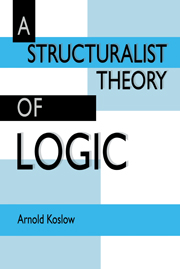Book contents
- Frontmatter
- Contents
- Preface
- Part I Background
- Part II Implication relations
- Part III The logical operators
- Part IV The modal operators
- 25 Introduction
- 26 Modality
- 27 Modals: Existence and nonextensionality
- 28 Special modals
- 29 The possibility of necessity-style modals
- 30 Modals revisited I
- 31 Quantification and modality
- 32 Modals revisited II
- 33 Knowledge, truth, and modality
- 34 The comparative strength of modals
- 35 Kripke-style systematization of the modals without possible worlds
- 36 Model functions, accessibility relations, and theories
- 37 Migrant modals
- Appendix A An implication relation for the integers in the programming language BASIC
- Appendix B Symmetric sequents as products of implication relations and their duals
- Appendix C Component-style logical operators and relevance
- Notes
- Bibliography
- Index
- Frontmatter
- Contents
- Preface
- Part I Background
- Part II Implication relations
- Part III The logical operators
- Part IV The modal operators
- 25 Introduction
- 26 Modality
- 27 Modals: Existence and nonextensionality
- 28 Special modals
- 29 The possibility of necessity-style modals
- 30 Modals revisited I
- 31 Quantification and modality
- 32 Modals revisited II
- 33 Knowledge, truth, and modality
- 34 The comparative strength of modals
- 35 Kripke-style systematization of the modals without possible worlds
- 36 Model functions, accessibility relations, and theories
- 37 Migrant modals
- Appendix A An implication relation for the integers in the programming language BASIC
- Appendix B Symmetric sequents as products of implication relations and their duals
- Appendix C Component-style logical operators and relevance
- Notes
- Bibliography
- Index
Summary
D modals
Definition 28.1. Let I = 〈S, ⇒〉 be an implication structure. We shall say that a modal operator φ on I satisfies the D condition if and only if for all A in S, φ(A) ⇒ ¬φ(¬A).
One reason for studying modals that satisfy this special condition can be traced to the interest in what is obligatory and what is permissible. We shall not worry, for the moment, whether it is acts, or sentences, or statements upon which the corresponding operators O and P are defined. It is suggested that “P(A)” (“it is permissible that A”) conveys that it is not obligatory that “not A” (or it is not obligatory that you do “not A”), and conversely. Thus it looks as if “P” might be defined simply as “¬O¬,” and it is then argued that the condition O(A) ⇒ P(A) holds: It is obligatory that A implies that it is permissible that A. Nothing can be both obligatory and not permissible. Together with the definition of “P,” we have the particular condition O(A) ⇒ ¬O(¬A) for all A's in the relevant structure. This is, then, if one is persuaded, a particular case of a D modal.
There is another way of looking at the D condition that is more logical in flavor and in turn sheds some light on the plausibility of the D condition holding for obligation.
- Type
- Chapter
- Information
- A Structuralist Theory of Logic , pp. 265 - 289Publisher: Cambridge University PressPrint publication year: 1992



